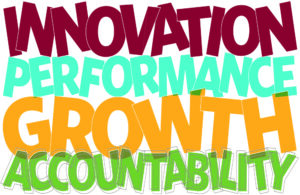Accountability is both a condition and an agreement. As a condition, accountability requires that people act consistently in a way that aligns with their stated commitments. As an agreement, accountability is something much more personal. As a consensus between two (or more) parties, accountability—when honored—requires mutual trust. It is perhaps no surprise that accountability is one of the critical components of high-performing organizations.
But how does accountability in business fuel corporate growth?
Here are three ways:
Accountability in Business Is a Requisite for Innovation
Innovation requires a strong leadership mandate, dedicated infrastructure, proprietary processes and a supportive culture. Yet accountability is the glue that binds these components. Within an organization, innovation requires creativity, but it often needs guardrails.
Accountability provides a framework and structure by not only encouraging collaboration, but also creating a self-regulating body where a team’s commitments are amplified under a banner of trust.
Accountability in Business Drives Performance
High-performing teams are often groups of cross-functional counterparts moving toward a common goal. By emphasizing accountability, enterprises can reduce sunk costs and avoid miscommunication among team members. If a lack of accountability can stifle innovation and growth, then well-defined roles, clearly stated objectives and consistent monitoring not only enhance performance but can supersede many of the pitfalls that breed low morale when accountability is lacking.
Accountability in Business Fuels Growth
Perhaps the most impactful output of accountability is the way in which it can influence corporate culture until eventually it spreads like wildfire and creates a culture of accountability. No shortage of studies have shown that engaged employees have a higher likelihood of creating a culture of accountability, which is a prerequisite for both growth and innovation. Accountability is a key requisite for growth due in no small part to the trust and productivity it can unlock.

If your goal is to build a culture of accountability, begin by being clear about what you expect of others, and of yourself. The more people understand how their roles fit into the big picture, the more likely they are to become inspired—and the more likely you are to have accountability enhance your ability to catalyze long-term performance and growth goals.
This article appeared in the Fall 2022 issue of Insigniam Quarterly with the headline “How Accountability Drives Growth.”
To begin receiving IQ, click here.






